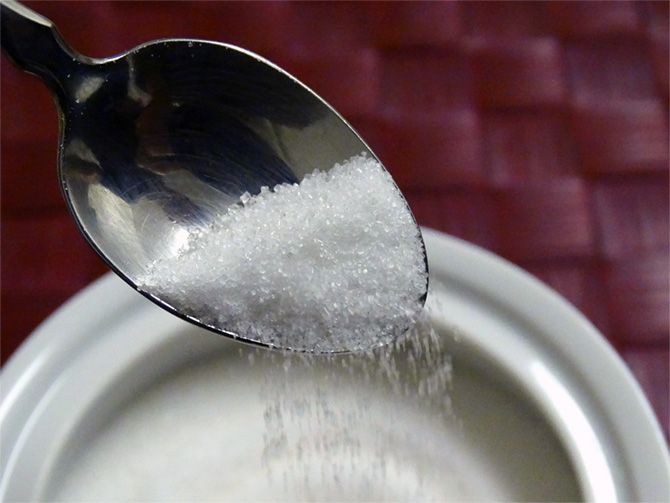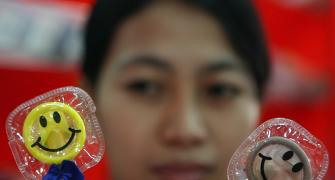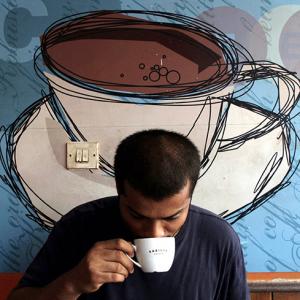The phrase 'salt to taste' is a misnomer in the Indian context, says Dr Sanjay Kalra.

Salt and sugar form a major part of our daily diet. With people's lives becoming increasingly busy, processed foods have become the norm of the day.
These foods are high in sugar and salt content.
Just like our body needs different kinds of foods and nutrients, sugar and salt are also helpful in small amounts.
However, too much of these can put a person at risk.Health complications such as heart disease and diabetes find way when processed foods replace the healthy ones we should be eating, such as whole grains and vegetables.
One cannot really debate on whether which of the two -- sugar and salt -- are worse for heart health.
A number of studies have been conducted to show the effects of sugar and salt on the heart.
Excess sugar can cause inflammation of the arterial walls. Such inflammation of the blood vessels can lead to heart disease and strokes.
Meanwhile, too much salt can increase the volume of body fluids thus raising the blood pressure.This again can lead to stroke or heart disease.
The good and bad side of salt
Our body needs salt, or sodium chloride, for some essential functions such as nutrient absorption and transport.
When salt breaks down in the body, chloride becomes a part of the acids in our digestive tract. These acids absorb nutrients from our food.
Sodium on the other hand has an effect on the volume of liquids retained by our body outside the cells.
This activity determines the volume of blood, regulating the blood pressure in turn.
The last line explains why excess salt can lead to high blood pressure and increase the risk of heart problems.
An increased intake of sodium can cause hypertension, or high blood pressure.
The good and bad side of sugar
Sugar refers to any simple carbohydrates like glucose, fructose, and sucrose.
The carbohydrates we consume break down into these sugars and release energy. Fruits and other such foods are rich in natural sugars and not harmful to the body.
Complex carbohydrates are better than simple sugars for the body. In addition, many manufacturers add sugars to processed foods and reduce the actual nutrients.
Artificial and refined sugar can lead to weight gain. With increased weight, other problems such as diabetes and blood pressure can follow leading to heart disease.
In a study published in JAMA: Internal Medicine, those receiving 17 per cent to 21 per cent of their calorie count from added sugar were at a 38 per cent higher risk of getting cardiovascular diseases.
The phrase 'salt to taste' is a misnomer in the Indian context.
Salt is used in curries, salads, and other dishes, and in large quantities in pickles.
Our current eating habits have also led to increased consumption of refined sugar.
A diet that is low in salt and composed of natural sugars can help in averting the risk of acquiring heart diseases.
About 40 per cent sodium is found in common table salt. Processed foods should be avoided as far as possible to reduce the amount of sugar being taken in by the body.
Thrice a day we do something that has the power to help protect our heart: we eat!
The sugar and salt in all those meals has an impact on our heart.
Heart disease is a silent killer as many people do not realise there is a problem.
***
Here are some tips one can follow to counter the effects of excess sugar and salt.
Make healthy tasty
Healthy foods can taste great too
We need to make some major changes in our eating habits for the sake of our heart. Explore options and see how you can make something tasty out of healthier stuff.
Fruits and vegetables first
These should form the building blocks of any diet.
About half of your plate should be made up of fruits and vegetables since they are rich in nutrients that can protect the heart.
Potassium in fruits and vegetables is good for controlling blood pressure. The fibre in them helps you feel full for a longer time and decreases cravings for processed food.
Control that craving
Nothing beats sugar and salt for taste despite many of us knowing that too much of these is bad.
Added sugar means more calories and should be limited.
Some sources of added sugar and salt also include soda, sweetened tea, that packet of potato chips you crave, and even salted nuts.
Excess salt raises blood pressure putting more strain on the heart.
Home-cooked food is always better. However, if you do not have time, opt for healthier options like salads, sandwiches without a mayo dressing, etc.
The author Dr Sanjay Kalra is consultant endocrinologist, Bharti Hospital Karnal and vice president, South Asian Federation of Endocrine Societies.









